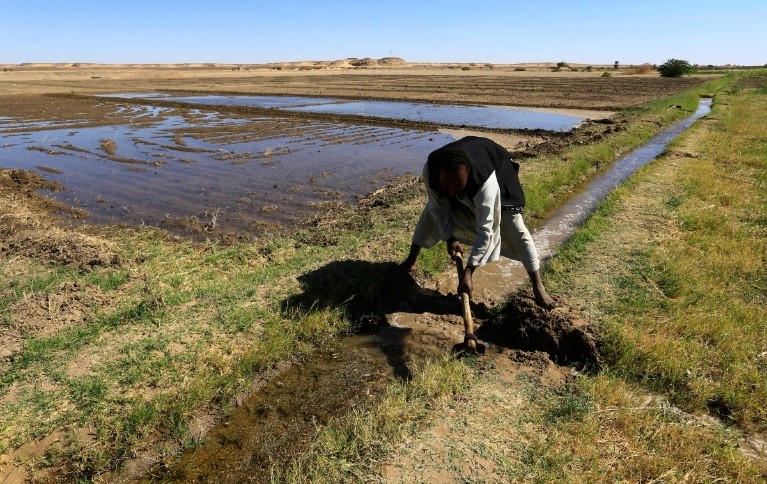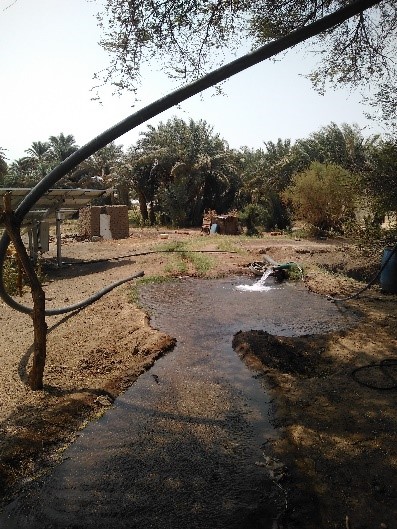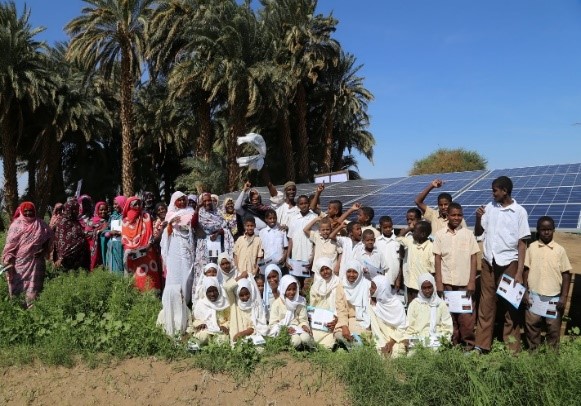Promoting the Use of Electric Water Pumps for Irrigation in Sudan
Description
Under the project Promoting the use of electric water pumps for irrigation in Sudan, the Ministry of Water Resources Irrigation and Electricity, supported by the UNDP-GEF grant of USD 4,365,753, adopted a solar irrigation programme for replacing diesel water pumps with PV pumps in the Northern State of Sudan. The project aimed to distribute PV pumps in its initial phase and to create the State PV Fund afterwards. This fund constitutes a financing mechanism associated with a subsidy that reduces the high capital cost of the pump, decreases risks and increases the capacity of the farmers to purchase the pumps.
The agricultural sector in Sudan contributes approximately to one third of its Gross Domestic Product (GDP), is reported to employ 80% of the workforce and 65% of the population is heavily reliant on it. In agriculture-reliant rural areas, electricity access is not available for almost 80% of the population. Moreover, after Sudan’s divide from the oil-rich South, north Sudan no longer has significant oil or gas production. On top of that, climate change exacerbates the stress for Sudanese people already struggling with poverty and environmental degradation, which impacts those in rural areas more severely. <br />
<br />
Solar irrigation initiatives represent an innovative, cutting-edge and potentially disruptive solution to overcome the country-wide challenges stated above. Firstly, solar irrigation focuses on activating agriculture, a key sector in Sudan’s economy, in which investment has the potential of driving economic growth and social development in the country. Secondly, the introduction of solar technology through appropriate financing mechanisms, contributes to amplify the Sudanese renewable energy sector, while contributing directly to the implementation of SDG’s. Solar water pumps constitute a cleaner, more efficient system, and in the long run, also cost effective compared to diesel water pumps. Thirdly, solar irrigation is specifically targeted to individual farmers, and thus, empowering a sector of the population that has been generally excluded from finance products that allows them to leave a cycle of inequality, poverty and food-insecurity.<br />
<br />
While consolidating an unprecedented example of innovative climate finance in Sudan, the project Promoting the use of electric water pumps for irrigation in Sudan addresses the implementation of the first, second, sixth, seventh, eight, thirteenth and seventeenth SDG, as it directly contributes to poverty and hunger eradication, clean water and energy access, economic growth, climate action and strong partnerships. The other SDG’s are indirectly addressed as well.<br />
<br />
Particularly, the Fund has an impact on community resilience. Moving away from diesel dependence which has volatile prices, and the use of diesel pumps that often contaminate water and surrounding vegetation, into more efficient solar systems, has several benefits. It reduces the cost for water pumping, allowing farmers to cultivate water-intense summer crops, improving land use, increases penetration to clean energy and raise awareness and trust in PV systems, that could be adopted for other purposes.
Sudanese public sector institutions:
At the national level: Ministry of Water Resources, Irrigation and Electricity, Ministry of Finance and Economic Planning, Treasury of Sudan.
At the regional level: State Government, State Ministry of Agriculture
Central Bank of Sudan and other partners from Sudan’s banking sector.
Private sector: national and local solar equipment suppliers.
International financial organizations: initial grant from GEF.
Main beneficiaries are the farmers of the Northern State.
In its initial phase, funds were allocated to buy, distribute and install 28 demonstration PV solar pumps to selected Northern State farmers in the first year of the project. In the second phase of the project, 1,440 solar pumps in the State were subsidized in coming years, through the creation of a Northern State PV Fund. The Northern State PV Fund constitutes a financing mechanism associated with a subsidy that reduces the high capital cost of the pump, decreases risks and increases the capacity of the farmers to purchase the pumps. To carry out this task, the GEF public resources have been used to mobilize a total investment of USD 17.9 million, with the participation of 11 commercial Banks, plus USD 2.5 - 3 million provided by the Ministry of Finance to exempt the imports of the solar pumps from VAT and other custom duties.
The implementation of the Fund is orchestrated throughout an institutional mechanism that occurs at two levels, national and state, and eventually linked to the community level formed by rural farmers. The Fund is populated with resources from a range of domestic and foreign organizations, which currently includes Treasury of Sudan, Sudan’s banking sector, private sector technology suppliers and international finance mechanisms. Deposited funds are accessible to farmers through loans. The subsidy scheme for the purchase and installation of the water pump equipment is as follows: 50% is subsidized by the Ministry of Finance, 25% is subsidized by the State Government, 12.5% is directly subsidized by the specific project (with contributions from external partners), and the farmer is responsible for the remaining 12.5%, which is obtained through the loan. Re-payment of the loan takes place every 12 months, for a period of 4-7 years.
The PV Fund has a direct impact on farmers, that usually suffer from lack of access to financial products. This innovative micro-finance system enables them to access opportunities for growth. Solar pumps result in cultivation of crops during the whole year, as pumping water is also economically viable during the summer once use of diesel is not longer necessary. This means more food production, more efficient land-use and higher revenues for farmers. In the Northern State, 28 farmers were provided a solar pump, and another 1440 were able to access one through the finance mechanism put in place.
The project has had a strong impact on local empowerment. The engagement of local and regional authorities has been one of the keys to the success of the project. Local governments and local technology supply companies have benefitted from the engagement with one another and the exposure to potential customers, but also from the collaboration with and resources from the national government.
The project has brought also strong partnerships at the national level, with ministries, banks and private sector collaborating for the creation of the PV Fund. Also, it enhanced the institutional capacity to understand and address the food-energy-water nexus in Sudan.
The strong commitment of national and regional governments, farmers and other partners has been crucial to the development of the programme. At the same time, the project had to emphasize on de-risking investments in solar technology. It was necessary to overcome trust barriers from investors and supplier companies and encourage farmers to accept the risks of taking loans. After seeing the results, farmers have been convinced on the benefits of solar water pumps, and in some cases are ready to purchase themselves, outside the PV Fund scheme.
Extensive support was provided by UNDP to ensure that national institutions where committed to scale-up solar credit access to other regions in Sudan. The National PV Fund concept emerging from the demonstration of the Northern State PV Fund is the result of such commitment from Sudanese authorities to replicate the success in other States.
Also, in the creation of the Northern State PV Fund, the GEF grant has been used to mobilize a total investment of USD 17.9 million, with the participation of 11 commercial Banks, plus USD 2.5 - 3 million provided by the Ministry of Finance to exempt the imports of the solar pumps from VAT and other custom duties. The initial amount of USD 4.4 million granted by GEF has thus catalyse foreign investment of another USD 8 million, plus domestic investment of USD 17.9 million.
Promoting the use of electric water pumps for irrigation in Sudan and the consequent concept of the National PV Fund, represent an excellent example of innovative climate finance, which is crucial for the achievement of Sudan’s NDC’s and the global SDG’s. Firstly, it encompasses a solid structure for public and private partnership, that can now join efforts on the implementation of the development agenda in Sudan. Moreover, the Fund also creates an enabling environment needed to scale-up climate actions, a proved mechanism for catalysing initial public investment into large private investment. <br />
<br />
Secondly, the origin of such investment is not limited to the country of Sudan, but aiming at cross-sector blended finance, from domestic and global sources. The solar irrigation initiative embodies a ground-breaking mechanism for rural access to such global finance. The National PV Fund scheme is directly targeting vulnerable people, an action that indeed can unlock economic growth in agriculture, one of the major sectors in Sudan’s economy. <br />
<br />
Thirdly, this financial model presents a highly innovative approach to vertical implementation, connecting the interests of national and regional authorities while contributing to global obligations of Sudan. In this sense, top-down policies translate into bottom-up actions, with individual beneficiaries and families playing a leading role in the incorporation of climate activities. Especially in the case of Sudan, the Fund is a successful financial mechanism to deal with climate change induced drought disasters and adjusting to post-crisis recovery challenges.
SDGS & Targets
Deliverables & Timeline
Resources mobilized
Partnership Progress
Feedback
Action Network


Timeline
Entity
Region
- Africa
Geographical coverage
Photos



Website/More information
Countries
Contact Information
Min Htut Yin, Programme Advisor
